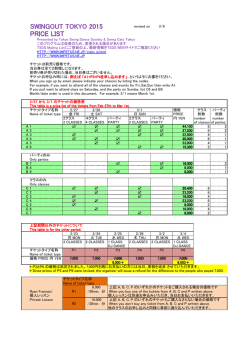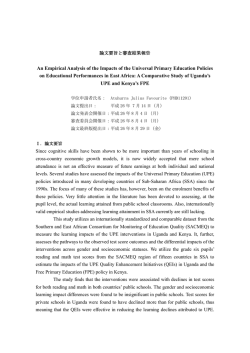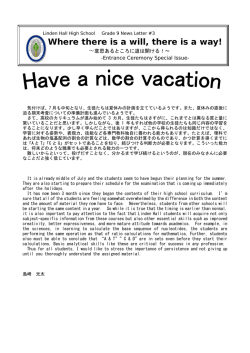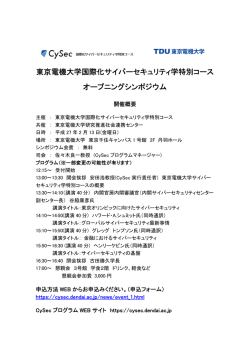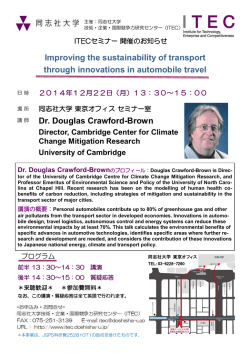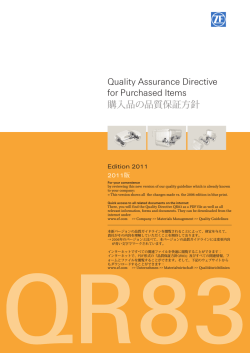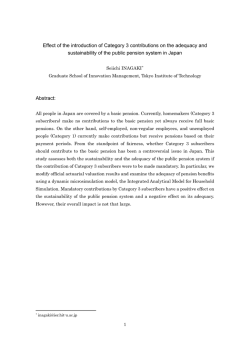
Sustainable Community 持続可能なコミュニティ
専門分野短文表現力ーTopic (2) Sustainable Community 持続可能なコミュニティ Sustainability is an approach to thinking that focuses on the long term and the interrelationships between human and natural systems. 持続可能性は、長期的な考え方及び人間と自然システムの 相互関係を中心にする思想への一つのアプローチ(扱い方、 取り上げ方)である。 Fundamental to this approach is considering how we meet our present needs while ensuring that future generations can continue to meet their needs. いかにしてわれわれが現在の需要を満足すると共に、持続 的に将来の世代の需要も満足できることを確保しようとす る考えがこのアプローチの基本である。 Sustainability involves integrating social, economic and environmental considerations. Choosing the most sustainable approach implies that actions we take today will not degrade the quality of life in our communities or the natural systems that support them. 持続可能性は社会・経済・環境的な考えを一体化(統 合)することが必要とする。最も持続可能なアプローチ を選択するには、われわれが今日とる行動が自分のコ ミュニティにおける生活の質、またはこれらのコミュニ ティを支える自然システムの質を下げないことを意味す る。 A sustainable community is one which strives, over time, to become more environmentally sound, economically viable, socially just, and democratic. 持続可能なコミュニティとは、時間の経過と共に、より環 境的な健全性、経済的成長の持続性、社会的公平性と民主 性に達成するように努力することである。 ENVIRONMENT 環境 Environment includes information about the natural resources themselves (i.e., wetlands, air, forests, and water); human impacts which affect their health (i.e., waste disposal, growth and development, energy); and consequences to humans from their use and enjoyment (i.e., environmental awareness and aesthetics; environmental equity and justice). 環境は自然資源そのもの(たとえば湿地、空気、森林、水) や、人間自身の健康に及ぼす影響(たとえば廃棄物、成長と 開発、エネルギー)や、環境に対する利用と楽しさの人間自 身に及ぼす結果(たとえば環境意識と美感、環境公平性と評 判)などの情報を含む。 ECONOMY 経済 Economy measures individual and community wealth (i.e., income trends, poverty, personal consumption); economic opportunities (i.e, jobs, tourism, environmental businesses); and economic performance (i.e., productivity, cost-effective government infrastructure). 経済は個人とコミュニティの財産(たとえば収入傾向、貧困、 個人消費)、経済的な機会(たとえば職業、旅行、環境ビジ ネス)、経済的な行為(たとえば生産品、費用効果のある政 府のインフラ)などを評価する。 Many of these categories link with those under Environment, Society, and Governance &Politics. これらの多数の分野は環境、社会、管理と政策に属する 分野に結びつく。 SOCIETY 社会 Society encompasses a range of concerns dealing with people's quality of life. Some are quantitative, such as "literacy" and "birthrates". 社会は人間の生活の質を取り扱う一連の関心を取り囲んでい る。これらの関心の一部は量的なものである。たとえば「文 盲率」と「出生率」。 Others, however, seek to measure qualitative aspects such as "level of stress", "community spirit", "civic involvement", and "spirituality". しかし、ほかには、例えば、「ストレスの程度」、「コ ミュニティ精神」、「市民活動の参加」、「宗教」のよ うに質の面の評価も求める。 Qualitative indicators can be somewhat difficult to measure because they depend on information gathered from surveys, interviews, and other means of finding out how people think, what they care about, and how they feel. 質の面の評価を行うのは多少困難である。なぜなら、これらの 評価は、人々の考え方、関心事、感じ方を把握するためのサー ベイやインタビューや他の方法によって収集された情報に依存 しているからである。 Yet, they are as important as are those which are more easily extracted from statistical data. For example, decisions about public safety depend on knowing the number of violent crimes in a place as well as whether parents feel comfortable allowing their child to play in a nearby park. しかしながら、これらの評価は、統計データからより容易に抜 粋された量的評価と同様に重要である。例えば、公衆安全に対 する判断では、ある地区での暴力犯罪の数量を承知するだけで はなく、こどもが付近の公園で遊ばせる両親の安心の程度にも かかっている。 GOVERNANCE & POLITICS 行政と政策 Governance & Politics deals with people's sense of empowerment, responsibility, and accountability. 行政と政策は人々の権限付与、責任、義務に対 する意向を取り扱う。 It is broader than people's perceptions and expectations of government. It also measures people's ability to feel in charge of their lives and to hold themselves and others accountable for producing desired results. 行政と政策(の扱う範囲)は人々の知覚の経験と統治への期 待値より広い。それはまた自分の生活をコントロールできる と感じる人間の能力を測るものであり、あるいは、理想的な 結果を生むことに責任のある自分や他人を抑える人間の能力 を測るものである。 Again, information and data listed under this heading are linked to responses under the other ones. For example, the degree to which citizens participate may depend on their level of poverty (Society), their employment situation (Economy), and/or their environmental health (Environment). また、この見出しに記入された情報およびデータは他の見出 しに記入されたことへの反応とつながっている。例えば、市 民参加の程度は貧困のレベル(社会面)、雇用状況(経済 面)、環境の健全(環境面)によって決まる。
© Copyright 2026
